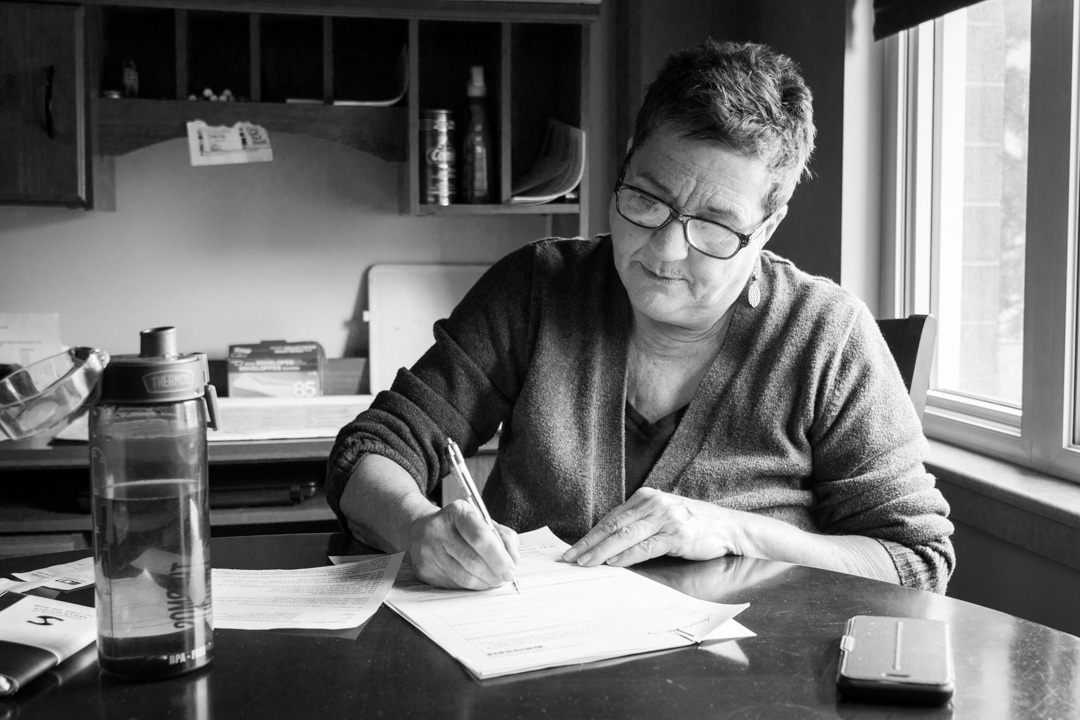Chapter 3:
Connie
Connie Reid’s dream as an 18-year-old teenager was to be a high school English teacher. And after spending two weeks with her at work, it’s easy to see that fit.
At 62-years-old, Connie’s a badass, and it shows when she walks into the room. Her voice is raspy from years of smoking cigarettes, but it suits her short hair, trendy glasses and eye-lined eyes. She’s rarely seen without a Tim Hortons Iced Cappuccino in her hand.
She’s a modest woman, but it’s hard not to be impressed by her. As a child, her family moved across Canada many times, following whenever her dad got a new job. The relocation didn’t end as an adult – her years have been scattered in Victoria, Edmonton and Calgary.
A single mom since her kids were 13 and 11, she’s worked everything from reception and administration to cleaning houses and working at a Schizophrenia society in Calgary as an outreach coordinator.
The fact that she grew up in a difficult living situation – her father was an alcoholic – explains her draw to professions where she helps others in vulnerable situations.
“After raising kids,” said Reid, “I thought, what do I want to do that’s meaningful?”
She’s burnt out all the time but said it is the greatest job she’s ever had.
“I love it.”

Skills Society
The Skills Society hasn’t always accepted clients diagnosed with FASD, but its history with FASD can be traced back to one single event six years ago. One that Bev Hills, senior manager at the Skills Society, remembers vividly.
A young woman – she had just turned 18 – showed up on our doorstep, said Hills, and we failed her completely. They knew something was wrong and knew she required support, but didn’t know what to do; her disability wasn’t one they normally worked with.
For people with developmental disabilities that aren’t FASD, their goal is to provide support until the individual no longer needs it.
The idea was to work ourselves out of a job, said Lasha Roberts, community manager with the Skills Society.
But adults with FASD like Ben require some level of support their entire lives. For that young woman six years ago, they realized too late she had FASD.
“It was a real eye-opener,” said Hills. “What we were doing was wrong. And it changed our entire way of supporting these individuals.”
A new model
Hills is the first to admit they’re always learning new and better ways to support adults with FASD. They realized their model of 24-hour, one-on-one support was not only intrusive for their clients, but costly. They went searching for an existing facility that would be open to housing their clients and working with their outreach workers in a Supportive Independent Living outreach situation.
That’s when they found the Melcor building, a safe place in a familiar downtown location that was willing to accommodate an on-site support system.
As a Supportive Independent Living housing model, the Skills Society Melcor project operates by having support workers on site 12 hours a day, seven days a week.
The Skills Society team at Melcor operates on a constant rotation of shifts; the support staff are all involved with all the clients. Tasks change daily; it’s completely dependent on the needs of the clients, like Ben.
Their office is in the lobby of the building. They’re visible and always available when a client decides to reach out, something that never happened with the one-on-one support. The support staff are friends and advocates, rather than rule makers.
And by being on site every day, they are better able to recognize when something isn’t as it should be – if Ben becomes uncharacteristically reserved, for example – and handle the situation before it becomes an emergency.
Hills said all too often individuals wouldn’t reach out for help because they were ashamed or scared; once they realized help and intervention was needed, it had already reached a crisis mode and was too late.
But with staff available at Melcor 12 hours a day, seven days a week, the control is put back in the client’s’ hands; the spontaneity makes it seem like any support they need isn’t being forced on them.
Roberts said even though there are other Semi Independent Living models out there, most don’t provide support on weekends, which is what sets their model apart.
This works well for an adult like Ben, who’s empowered by the independence he gets living in his own environment.
Currently, Melcor houses ten Skills Society clients – clients that have experienced many placement breakdowns and were facing a housing crisis. They’ve either been evicted, were endangering themselves or others, or homeless.
According to Alec Johnston, the program director at Melcor, the Melcor staff and tenants have come to view the Skills Society staff as part of the community.
“They are just regular faces our tenants appreciate,” said Johnston.

Funding
When the Skills Society initially applied for funding to pursue the Melcor support model, they had to make the case for funding. Because the model hadn’t been done before, Roberts said the government was wary of putting money into something it wasn’t sure would work.
They were given a three-month trial period. It’s been a year and people see it’s working.
The Skills Society is funded by Persons with Developmental Disabilities, one of the provincially funded programs through the Ministry of Community and Social Services that provides financial support to adults with a developmental disability.
In terms of how disability funding is delivered, Alberta is divided up into seven Human Service regions, Edmonton being one of them. The Ministry of Community and Social Services allocates funds each of the seven regions on a case-by-case basis; organizations and agencies can then apply to their specific regions for funding when they need it.
When organizations apply for this governement funding (on behalf of the individuals they support) the individuals must first pass an eligibility assessment. There are three criteria: there must be documentation that proves the developmental disability occurred before age 18; the individual must have an IQ below 70; and the individual must show limitations in adaptable skills like personal care, money management and communications.
If they are determined eligible, the individuals are then assigned a caseworker who works with the individual and their families, guardians and/or support workers. They come up with a detailed plan that determines how much funding the support organizations in order to help.
Many advocates and medical professionals say IQ isn’t a predictor of function or a proper determinant of support needs.
Massey said the applicants can look wonderful on paper but can’t do things in real life.
“These are the kids that fail recess. They get into everything, and as adults they are going to do the same thing.”
Gloria Wesley works in the Disability Inclusion and Accessibility Division of the Ministry of Community and Social Services. She said because the IQ requirement is set by government legislation, it won’t be adjusted any time soon.
Lisa Rogozinsky, the Network Coordinator for the Edmonton and area Fetal Alcohol Network Society, said it’s been fighting for ten years to change the funding model for FASD because most adults with FASD do not quality, but it’s had no success. Often their IQ is far above 70, yet they are high-risk individuals who can’t survive without government support. That’s why the frontline programs they offer, like mentorship programs, where individuals and workers operate in more of a casual, friendship-like setting, are not based on IQ, and do not require an official diagnosis.
For the Skills Society, the Persons with Developmental Disabilities funding operates by giving the organization a certain amount of money to cover staff support hours, it’s not given directly to the individual in need. It doesn’t cover moving costs, furniture, damage deposits and other start up housing costs – so the Skills Society also operates on minimal fundraising and donations.
The number of people diagnosed with FASD has increased the past few years, which Hills attributes to an increased awareness of the disability across all systems (medical, education, judicial).
Since this government funding group doesn’t identify or keep track of diagnoses; they don’t have a database with exact numbers on how many individuals who are funded by the Persons with Developmental Disabilities actually have FASD.
But Wesley said the diagnosis isn’t important, it’s whether they meet the eligibility requirements.
Hills said as more people with FASD began coming forward to seek supports, the funding system became backlogged; the application process can now take anywhere from six to eight weeks.
Wesley said there are currently people who are eligible who’ve been told they’ll receive funding “in the future.”
But sometimes the future is too late.
Based on numbers from a September 2016 report, since its inception, Persons with Developmental Disabilites has served 3,420 individuals through 45 service providers. From numbers off their website, Of the people the Skills Society supports, about 350 of those individuals are funded through that program. From the same 2016 report,forty-eight per cent of the individuals funded by the disabilities program are between 18-34 years old. Only 5.7 per cent are over age 65.
Because Ben passes all the eligibility criteria, he receives PDD funding. But because people with FASD are high-needs individuals (meaning they will require some level of support their whole lives) they are draining the PDD system of dollars when they should be accessing funding from many different systems across different ministries, rather than just one.
For Hills, that problem is magnified when high levels of government make important decisions, such as funding eligibility, without talking to or spending time with frontline services workers, and individuals who need those services.
You have to understand all the positions when making a decision,” said Roberts.